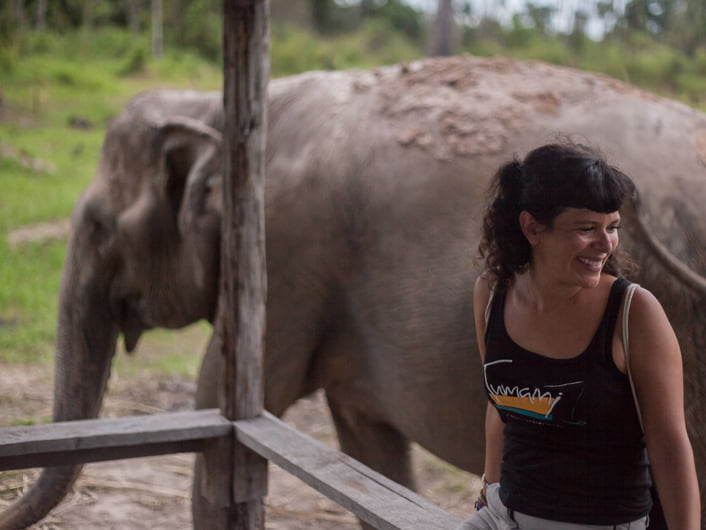
5 activities with animals that you should NOT do on your travels
 |
| Monkey in the rescued wildlife centre Bolivia. |
We confess: when we started travelling we didn't know it either. We saw people riding camels, or colourfully painted elephants in temples. Something told us it wasn't right, But we were unaware of the terrible reality of these practices! After more than 5 years organising solidarity trips, we tell you 5 activities with animals that you should say NO to on your trips.
1 Elephant shows
According to the 2017 report of World Animal ProtectionOf the 2923 elephants used in 220 tourist sites, three quarters suffered from unacceptable conditions. Some of them live in chains day and night.sometimes with chains of less than 3 metres.
If you see a show with these animals standing and holding themselves up on their hind legs, you should know that it hides cruel and inhumane practices. To train them, elephants are subjected to terrible punishments.
Another unnatural action for these large mammals is to bathing with tourists. These baths are harmful because you can catch diseases and because usually in the places where you can bathe with them (there are centres exclusively for bathing with elephants) the elephants spend hours in the water. Don't allow it!
 |
| This NGO rescues elephants from exploitation in Thailand |
2 Animals in arms
I'm sure it has happened to you. You go on an excursion to the jungle or to a natural park, and the guide offers you to catch that endearing animal. Don't do it! Don't take selfies with animals in your arms either. Why is this? In many countries where there is a legal loophole, baby animals are snatched from their mothers' arms and from the jungle to be used as tourist attractions. Travellers cannot resist holding them in their arms. But these animals do not and can never again live in their environment and, of course, cuddling tourists is not part of their natural habits.
 |
| Our NGO partner in Bolivia also rescues felines. |
What happens to these babies when they grow up? Many of them do not survive. According to World Animal Protection, baby sloths used on Amazon excursions survive for only 6 months.while those that live in the forest last up to 30 years. Something similar happens with koalas in Australia.
Also watch out for selfies and social media! Do not give the image that these animals are pets.. They are what they are: wild animals.
3 Swimming with dolphins
Whether in pools or in the sea, don't do it! Don't pick up their fins, don't kiss them or touch them: everything harms them! Don't go to their shows either. They are trained by being denied food. They are not smiling: they are hungry.
Watch the documentary The Cove if you want to go deeper into the subject.
 |
| Don't go to dolphin shows. They don't smile: they're hungry. |
4 Interacting with felines
Whether in temples, on safari or in zoos: animals such as tigers should NEVER be allowed to cuddle or interact with humans.. Remember the case of the Tiger Temple in Thailand, which had to close because it was discovered that the tigers were not docile: they were drugged to please travellers.
5 Getting too close or giving food
Have you ever travelled to India? If so, you will know that in many cities there is a serious problem with monkeys. They are so used to being fed by tourists that they are no longer afraid of humans. What's more, they are so used to being fed by tourists that they are no longer afraid of humans: approach and sometimes attack them to get food..
Conclusion: if you see animals both in natural areas and in cities, watch them from a distance and never give them food.. If you do this you will break their natural habits and they will stop foraging in the jungle to scavenge or steal from tourists. Don't get too close to them on safari either: give them their space, watch them from a distance, so they don't even notice you're there!
| A primate eating in the Bolivia project. |
One step further: a journey of solidarity with animals
And, if you like animals and want to go one step further, we encourage you to make a solidarity journey through Tumaini a:
- Bolivia: collaborates with a wildlife rescue centre. They have been victims of illegal trafficking and in this NGO they learn to live as naturally as possible.
- Thailand: learn how to take care of elephants, dogs and rescued cats.



